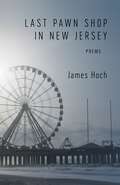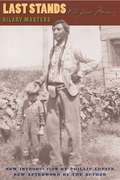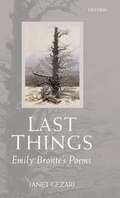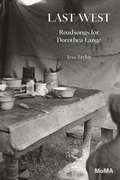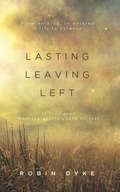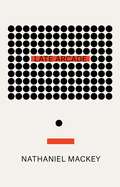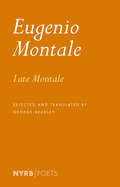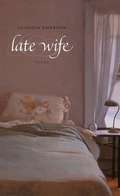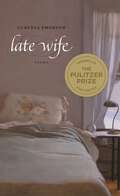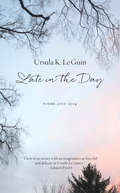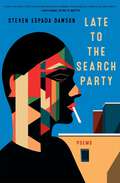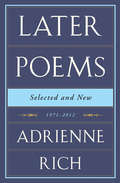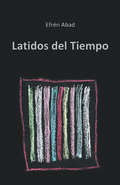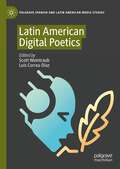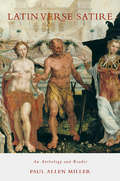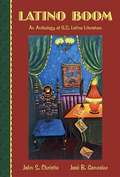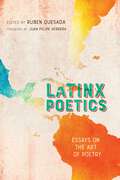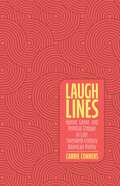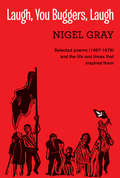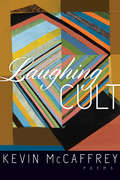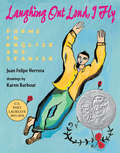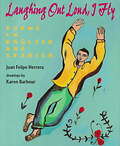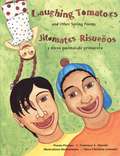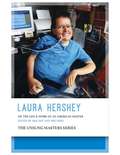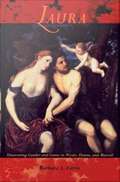- Table View
- List View
Last Pawn Shop in New Jersey: Poems
by James HochWith Last Pawn Shop in New Jersey, James Hoch gives readers a heart-lugged romp and a work of resistance, conversing with the interstices of public and personal histories and identities in the context of ecological deterioration. Drawing on emotional experiences prompted by his brother’s going to war in Afghanistan, the death of his mother from ovarian cancer, and the raising of his sons, Hoch investigates the difficulty of loving and of making beauty in times of crisis when faced with knowledge of its limitations and necessity. Lyrical and meditative, intense and intimate, his poems evoke landscapes with views of the New York water supply system, industrialization along the Hudson River, and the geology of the Palouse in the Pacific Northwest.A bare-knuckled argument for the sublime in the context of war and environmental degradation, Last Pawn Shop in New Jersey asserts the redemptive power of art as survival.
Last Stands: Notes from Memory
by Hilary MastersAn affecting and exquisitely drawn family portrait by the son of poet Edgar Lee Masters. - Library Journal
Last West: Roadsongs For Dorothea Lange
by Tess TaylorIn conjunction with the forthcoming book and exhibition 'Dorothea Lange: Words & Pictures', the acclaimed American poet Tess Taylor has written a poem that responds to Lange's legacy and their shared interest in their home state of California. Accompanied by reproductions of several of Lange's photographs and related ephemera, the poem includes quotes from Lange's notebooks, lyrics from contemporary 'roadsongs', as Taylor calls them, and bits of interviews and other found text. Taylor explores mass migration, climate change and homelessness, and features the stories of the people impacted by these crises, in keeping with Lange's compassionate and richly textured depictions of the human experience.
Lasting, Leaving, Left
by Robin DykeA beautifully written collection of poetry by Robin Dyke, inciting readers to engage with the profound emotions within themselves. Lasting Leaving Left explores the natural side of humanity, venturing through topics both universal and personal. Robin Dyke's lyricism shows readers the thread that connects man with nature and all things in between. The poems in this collection represent attempts to capture the image of the ideas and experiences of the moment--to explore the territory of something noticed and probe its source for meaning. Each poem emerged innocently on its own. When assembled as a collection the underlying theme of aging and departure became more evident--hence the title Lasting, Leaving, Left--aging as the art and courage of keeping the body in touch with the soul.
Late Arcade
by Nathaniel MackeyA new volume of the singular, ongoing, great American jazz novel Nathaniel Mackey’s Late Arcade opens in Los Angeles. A musician known only as N. writes the first of a series of letters to the enigmatic Angel of Dust. N.’s jazz sextet, Molimo m’Atet, has just rehearsed a new tune: the horn players read from The Egyptian Book of the Dead with lips clothespinned shut, while the rest of the band struts and saunters in a cosmic hymn to the sun god Ra. N. ends this breathless session by sending the Angel of Dust a cassette tape of their rehearsal. Over the next nine months, N.’s epistolary narration follows the musical goings-on of the ensemble. N. suffers from what he calls “cowrie shell at- tacks”—oil spills, N.’s memory of his mother’s melancholy musical Sundays— which all becomes the source of fresh artistic invention. Here is the newest installment of the National Book Award-winner Nathaniel Mackey’s From a Broken Bottle Traces of Perfume Still Emanate, the great American jazz novel of “exquisite rhythmic lyricism” (Bookforum).
Late Montale
by Eugenio MontaleLate Montale is a generous selection of the poems that the Nobel laureate Eugenio Montale wrote in the last decade of his life, including many drawn from notebooks he entrusted to his housekeeper, which appear here in English for the first time. In new translations by the American poet George Bradley that carry over all the wit and lucidity of the originals, each poem takes on a fresh immediacy. Together, they form an ideal introduction for readers unfamiliar with these late works, and for readers who have long admired them, a sparkling reminder of their subtle art of disillusion and surprise.
Late Wife: Poems
by Claudia EmersonIn Late Wife, a woman explores her disappearance from one life and reappearance in another as she addresses her former husband, herself, and her new husband in a series of epistolary poems. Though not satisfied in her first marriage, she laments vanishing from the life she and her husband shared for years. She then describes the unexpected joys of solitude during her recovery and emotional convalescence. Finally, in a sequence of sonnets, she speaks to her new husband, whose first wife died from lung cancer. The poems highlight how rebeginning in this relationship has come about in part because of two couples' respective losses. The most personal of Claudia Emerson's poetry collections, Late Wife is both an elegy and a celebration of a rich present informed by a complex past.<P><P> Pulitzer Prize Winner
Late Wife: Poems (Southern Messenger Poets Ser.)
by Claudia EmersonIn Late Wife, a woman explores her disappearance from one life and reappearance in another as she addresses her former husband, herself, and her new husband in a series of epistolary poems. Though not satisfied in her first marriage, she laments vanishing from the life she and her husband shared for years. She then describes the unexpected joys of solitude during her recovery and emotional convalescence. Finally, in a sequence of sonnets, she speaks to her new husband, whose first wife died from lung cancer. The poems highlight how rebeginning in this relationship has come about in part because of two couples' respective losses. The most personal of Claudia Emerson's poetry collections, Late Wife is both an elegy and a celebration of a rich present informed by a complex past.
Late in the Day: Poems 2010–2014
by Ursula K. Le Guin"There is no writer with an imagination as forceful and delicate as Ursula K. Le Guin's." —Grace Paley Late in the Day, Ursula K. Le Guin's new collection of poems (2010–2014) seeks meaning in an ever-connected world. In part evocative of Neruda's Odes to Common Things and Mary Oliver's poetic guides to the natural world, Le Guin's latest give voice to objects that may not speak a human language but communicate with us nevertheless through and about the seasonal rhythms of the earth, the minute and the vast, the ordinary and the mythological. As Le Guin herself states, "science explicates, poetry implicates." Accordingly, this immersive, tender collection implicates us (in the best sense) in a subjectivity of everyday objects and occurrences. Deceptively simple in form, the poems stand as an invitation both to dive deep and to step outside of ourselves and our common narratives. The poems are bookended with two short essays, "Deep in Admiration" and "Some Thoughts on Form, Free Form, Free Verse."
Late to the Search Party: Poems
by Steven Espada DawsonA raw, crystalline debut poetry collection exploring themes of family, addiction, belonging, and loss—a searching elegy of the fissures that have come to define contemporary American life.The unsettled border between absence and presence haunts this stunning collection, in which poet laureate Steven Espada Dawson contemplates belonging, identity, family, and grief in poems about his own half-immigrant Mexican American family: his dying mother who raised him, his addict brother who has been missing for more than a decade, and his absent father. Chronicled in four parts, shifting restlessly between childhood memories, the sudden disappearance of his brother, and the inevitable loss of his ailing mother, Late to the Search Party explores what it means to be a family of one—to be orphaned, whether by fate or by circumstance. In language that is both grounded and ethereal, Dawson tallies the losses and looks at what remains: the frustration and anger, the bewilderment and sadness—and the affection and humor that makes itself felt in spite of everything. A vivid and thoughtful meditation on love and loss, Late to the Search Party is an ode to the families that inspire and confound us all.
Later Poems: 1971-2012
by Adrienne RichThe final volume of poems assembled by America's most powerful and distinctive poetic voice. In Later Poems: Selected and New 1971-2012, the strong trajectory of the work of one of the most important artists of American letters is on display. This volume brings together a remarkable body of work. Included are Adrienne Rich's own selections from twelve volumes of published works, including the National Book Award-winning Diving Into the Wreck, An Atlas of the Difficult World, and her most recent volume, Tonight No Poetry Will Serve, along with ten powerful new poems, previously uncollected. Among these, "From Strata" is a kind of archaeology of the present day; "Itinerary" searches for an "indefinite future" in a menaced landscape; "For the Young Anarchists" offers a trope of skilled labor for political action; and the haunting voice of "Teethsucking Bird" reminds us of what we have been told to forget. This collection testifies to a monumental career that distinguished American literature in the late twentieth century and will continue to inspire readers for years to come.
Latidos del tiempo
by Efrén Abad<P>Este libro de poesía se presenta como un intento de indagar espacios interiores, tanto sentimentales como conceptuales, a través de la disciplina lingüística del soneto, puesta al servicio de una visión inmanente y exploradora de uno mismo y de la experiencia temporal o vital. <P>Cada uno de estos sonetos responde a una necesidad íntima de ofrecer un cauce emocional a las ensoñaciones que flotan en la memoria y en la conciencia del autor. <P>Esta necesidad de expresión personal aparece acompañada de valores poéticos densos y contagiosos a todos los lectores. <P>El mundo se detiene y deja sitio a lo inamovible, a lo eterno. Es como si el tiempo se quedase hipnotizado y el limitado yo alcanzase la morada encantada del todo.
Latin American Digital Poetics (Palgrave Spanish and Latin American Media Studies)
by Scott Weintraub Luis Correa-DíazLatin American Digital Poetics seeks to take the pulse of emergent poetic forms whose history is entangled with the computational and its AI dreams and achievements. This study carefully and thoroughly probes the intersection between the literary, the cultural, and the scientific-technological in order to reflect on the ways that digital technology has radically reshaped and reconfigured nearly all aspects of contemporary culture. The main idea of this book, then, is simple: by way of panoramic approaches to digital poetry as well as select case studies, we seek to account for the multi-directional exchange between poetry, technology, and culture via a (primarily) pedagogical approach.
Latin Verse Satire: An Anthology and Reader
by Paul Allen MillerA wide variety of texts by the Latin satirists are presented here in a fully loaded resource to provide an innovative reading of satire's relation to Roman ideology. Brimming with notes, commentaries, essays and texts in translation, this book succeeds in its mission to help the student understand the history of Latin's modern scholarly reception.Focusing on the linguistic difficulties and problems of usage, and examining aspects of meter and style necessary for poetry appreciation, the commentary places each selection in its own historical context then using essays and critical excerpt, the genre's most salient features are elucidated to provide a further understanding of its place in history.Extremely student friendly, this stands well both as a companion to Latin Erotic Elegy and in its own right as an invaluable fund of knowledge for any Latin literature scholar.
Latino Boom: An Anthology of U.S. Latino Literature
by John S. Christie Jose B. GonzalezLatino Boom: An anthology of U.S. Latino literature combines an engaging and diverse selection of Latino/a authors with tools for students to read, think, and write critically about these works. The first anthology of Latino literature to offer teachers and students a wide array of scholarly and pedagogical resources for class discussion and analysis, this thematically organized collection of fiction, poetry, drama, and essay presents a rich spectrum of literary styles. Providing complete works of Latino/a literature vs excerpts written originally in English, the anthology juxtaposes well-known writers with emerging voices from diverse Latino communities, inviting students to examine Latino literature through a variety of lenses.
Latinx Poetics: Essays on the Art of Poetry
by Ruben QuesadaLatinx Poetics: Essays on the Art of Poetry collects personal and academic writing from Latino, Latin American, Latinx, and Luso poets about the nature of poetry and its practice. At the heart of this anthology lies the intersection of history, language, and the human experience. The collection explores the ways in which a people&’s history and language are vital to the development of a poet&’s imagination and insists that the meaning and value of poetry are necessary to understand the history and future of a people. The Latinx community is not a monolith, and accordingly the poets assembled here vary in style, language, and nationality. The pieces selected expose the depth of existing verse and scholarship by poets and scholars including Brenda Cárdenas, Daniel Borzutzky, Orlando Menes, and over a dozen more.The essays not only expand the poetic landscape but extend Latinx and Latin American linguistic and geographical boundaries. Writers, educators, and students will find awareness, purpose, and inspiration in this one-of-a-kind anthology.
Laugh Lines: Humor, Genre, and Political Critique in Late Twentieth-Century American Poetry
by Carrie ConnersHumor in recent American poetry has been largely dismissed or ignored by scholars, due in part to a staid reverence for the lyric. Laugh Lines: Humor, Genre, and Political Critique in Late Twentieth-Century American Poetry argues that humor is not a superficial feature of a small subset, but instead an integral feature in a great deal of American poetry written since the 1950s. Rather than viewing poetry as a lofty, serious genre, Carrie Conners asks readers to consider poetry alongside another art form that has burgeoned in America since the 1950s: stand-up comedy. Both art forms use wit and laughter to rethink the world and the words used to describe it. Humor’s disruptive nature makes it especially whetted for critique. Many comedians and humorous poets prove to be astute cultural critics. To that end, Laugh Lines focuses on poetry that wields humor to espouse sociopolitical critique. To show the range of recent American poetry that uses humor to articulate sociopolitical critique, Conners highlights the work of poets working in four distinct poetic genres: traditional, received forms, such as the sonnet; the epic; procedural poetry; and prose poetry. Marilyn Hacker, Harryette Mullen, Ed Dorn, and Russell Edson provide the main focus of the chapters, but each chapter compares those poets to others writing humorous political verse in the same genre, including Terrance Hayes and Anne Carson. This comparison highlights the pervasiveness of this trend in recent American poetry and reveals the particular ways the poets use conventions of genre to generate and even amplify their humor. Conners argues that the interplay between humor and genre creates special opportunities for political critique, as poetic forms and styles can invoke the very social constructs that the poets deride.
Laugh, You Buggers, Laugh: Selected poems (1967-1979) and the life and times that inspired them
by Nigel GrayLaugh, You Buggers, Laugh is no ordinary collection of poems. Nigel Gray led an extraordinary life in extraordinary times. He was a political activist and performance poet in the UK during the days of rage and hope, flower power and free love, radical social change and political upheaval that typified the 1960s and 70s. He travelled on political forays to Southeast Asia, Africa, Ireland, and mainland Europe. This is a selection of poems from that time set in a context that explains the situations and experiences that inspired them. Nigel Gray, an Irish-born West Australian, is the multi-award-winning author of a hundred published books for adults and children.
Laughing Cult
by Kevin MccaffreyInspired by the spirit and approach of Bertolt Brecht's Manual of Piety, the poems of Laughing Cult often employ the structures of ballads, folksongs, and other traditional forms to create miniature sketches marked by romantic ambiguity, occultism, science fiction, and quirky angst. As cool in tone as a Lee Konitz solo and as lacking in affect as pop art, this first collection includes numerous poems that have appeared on the Exquisite Corpse website. To shape something aesthetically charged out of the spent elements and enervated thoughts of a slowly failing society: that's the challenge Laughing Cult has set for itself. These are two-dimensional poems for a one-dimensional age.
Laughing Out Loud, I Fly
by Juan Felipe Herrera Karen BarbourFrom U.S. Poet Laureate Juan Felipe Herrera, here are stirring poems that read like music. Awarded the Pura Belpré Honor for this book, Herrera writes in both Spanish and English about the joy and laughter and sometimes the confusion of growing up in an upside-down, jumbled-up world--between two cultures, two homes. With a crazy maraca beat, Herrera creates poetry as rich and vibrant as mole de olé and pineapple tamales . . . an aroma of papaya . . . a clear soup with strong garlic, so you will grow & not disappear. Herrera's words are hot & peppery, good for you. They show us what it means to laugh out loud until it feels like flying.
Laughing Out Loud, I Fly: A Carcajadas Yo Vuelo
by Juan Felipe HerreraA collection of poems in Spanish and English about childhood, place, and identity.
Laughing Tomatoes and Other Spring Poems
by Francisco X. AlarcónA bilingual collection of humorous and serious poems about family, nature, and celebrations by a renowned Mexican-American poet.
Laura Hershey: On the Life and Work of an American Master (Unsung Masters Series)
by Meg Day Niki HerdLaura Hershey's poetry reflects her commitment to disability activism and her identity as a member of the LGBTQ+ community. This book contains a representative selection of her poems as well as critical essays about her work.
Laura: Uncovering Gender and Genre in Wjatt, Donne, and Marvell
by Barbara L. EstrinHow do men imagine women? In the poetry of Petrarch and his English successors--Wyatt, Donne, and Marvell--the male poet persistently imagines pursuing a woman, Laura, whom he pursues even as she continues to deny his affections. Critics have long held that, in objectifying Laura, these male-authored texts deny the imaginative, intellectual, and physical life of the woman they idealize. In Laura, Barbara L. Estrin counters this traditional view by focusing not on the generative powers of the male poet, but on the subjectivity of the imagined woman and the imaginative space of the poems she occupies. Through close readings of the Rime sparse and the works of Wyatt, Donne, and Marvell, Estrin uncovers three Lauras: Laura-Daphne, who denies sexuality; Laura-Eve, who returns the poet's love; and Laura-Mercury, who reinvents her own life. Estrin claims that in these three guises Laura subverts both genre and gender, thereby introducing multiple desires into the many layers of the poems. Drawing upon genre and gender theories advanced by Jean-Franois Lyotard and Judith Butler to situate female desire in the poem's framework, Estrin shows how genre and gender in the Petrarchan tradition work together to undermine the stability of these very concepts. Estrin's Laura constitutes a fundamental reconceptualization of the Petrarchan tradition and contributes greatly to the postmodern reassessment of the Renaissance period. In its descriptions of how early modern poets formulate questions about sexuality, society and poetry, Laura will appeal to scholars of the English and Italian Renaissance, of gender studies, and of literary criticism and theory generally.
